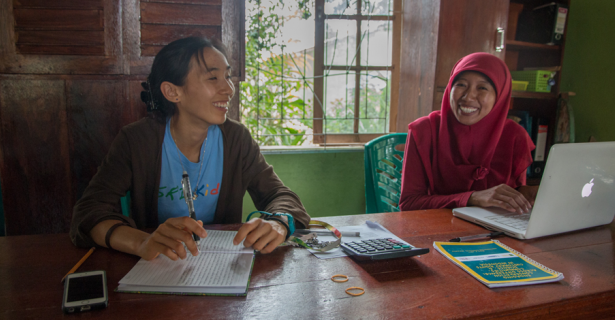I have known Dewi since 2011 when my sister and I taught her and a few kids in a remote village in Borneo, Indonesia how to play Uno. Despite not sharing a common language, we spent countless afternoons that summer exploring the village and the edge of the rainforest. Dewi was part of the inaugural session of ASRI Kids in 2012, an experimental conservation education program taught under a thatched roof. She was one of the most active participants in the program that summer, and after it was over, she volunteered to help Etty, the program coordinator, teach at the new schools to which ASRI Kids was expanding. In 2016, Dewi led a group of her friends, and they started ASRI Teens, a continuation of the ASRI Kids program, where graduated students participated in conservation field-trips in exchange for helping with ASRI’s larger conservation efforts.
Throughout Dewi’s participation in ASRI’s education programs, Etty became her mentor. Dewi and the kids would come to Etty’s desk almost daily to help with whatever she needed or just to hang out. As Dewi got older and started high school, Etty helped her find an extracurricular homework group and supported her studies. A few weeks ago, Dewi came to Etty’s office crying with an open envelope. She had been accepted to Forestry school with a scholarship from the Indonesian government.
During my trip to Borneo this year, Dewi traveled to Pontianak to register for her first semester of university. It was her first time away from home by herself, and she had traveled six hours by speedboat to accept her scholarship and visit her new campus.
We created ASRI Kids to empower youth to make a difference in the conservation of their own rainforest, a purpose the program has achieved. Just a couple of years ago, it was rare for Sukadana’s youth to attend university, let alone to travel far from home to do so. Yet all of the ASRI Kid graduates who participated in the program in 2012 are off to continue their studies: Rendi is studying Animal Husbandry in Java, Ahlun and Geris are studying English and Business in Pontianak, and Nita will begin her first year studying Hospital Management in Java.
Reflecting on this trip to Sukadana, the next-step for the ASRI youth programs is finding a way to follow through on our promise to support the empowerment of these students. I want to build on the current education programs and create a scholarship fund for ASRI Teen graduates persuing higher education. The scholarship program should not only provide the necessary monetary funding for students, it should include active support in the form of internship placement and shadowing opportunities.
Dewi was lucky to receive a scholarship, without which the possibilities of her continuing her studies would have been much harder. But entry into higher education for ASRI Teens’ students should not be limited by economic resources. Throughout the program, we expose youth to the diverse conservation and health jobs at ASRI, our parent organization. In doing so, we challenge students to think broadly about the ways in which they can contribute to environmental conservation, and we encourage them to pursue paths that help them realize their visions. Following through on supporting these young conservationists is the necessary next step to advance the program’s core mission.

